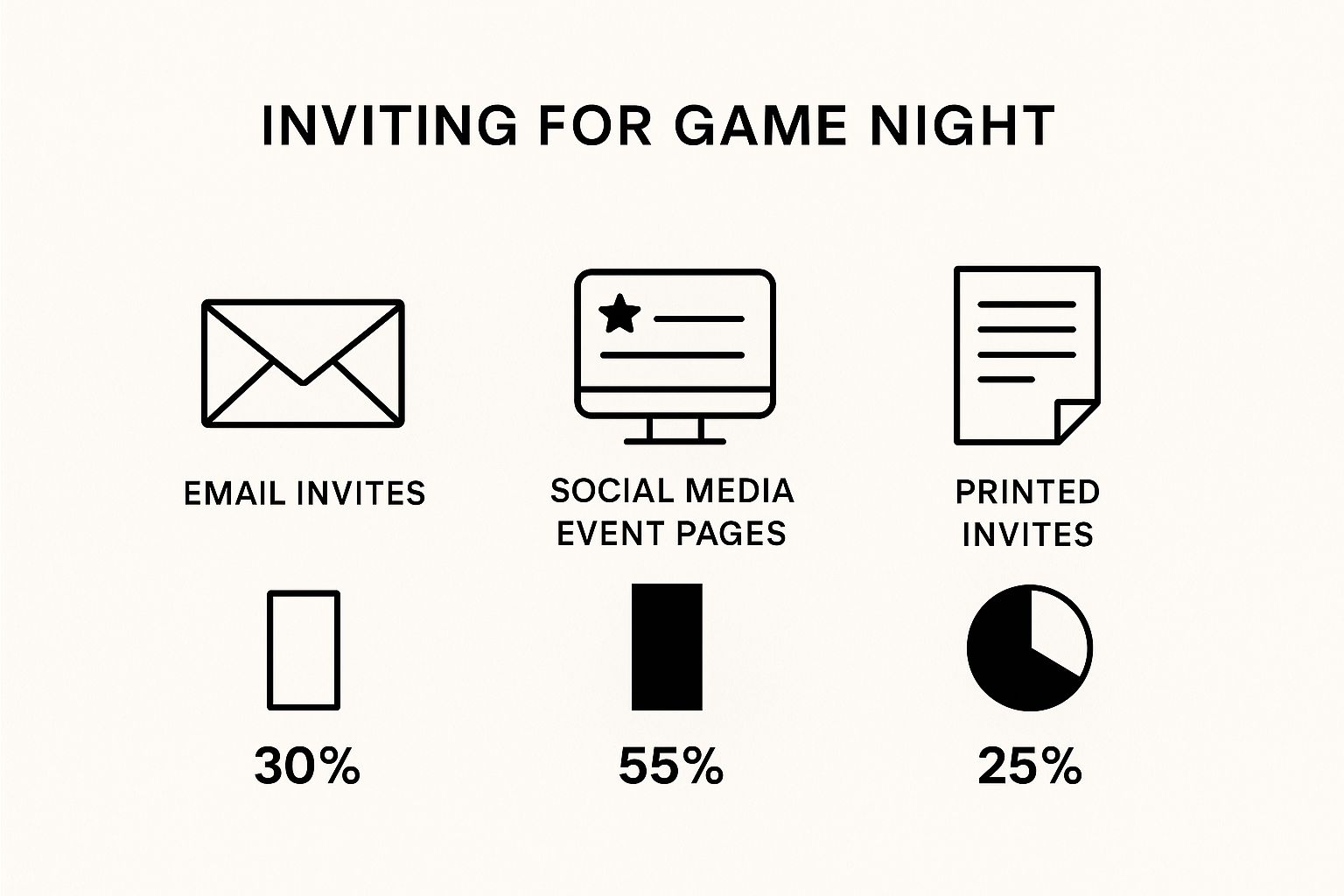Creating Your Perfect Game Night Space
So, you're thinking about hosting a game night? Awesome! But before you send out those invites, let's talk about setting the stage. Transforming your living room into game night central doesn’t require a full renovation, but a few tweaks can make a world of difference. Trust me, I've learned a few things along the way.
Lighting is key. You need enough so everyone can see the game, but not so much that it creates a glare. I once hosted a card game under some seriously bright lights, and let's just say squinting became the main event. Soft, diffused lighting sets the mood and keeps the game flowing smoothly.
Then there’s the furniture. Even temporarily pushing furniture against the walls can open up the space and encourage mingling. Think of it as creating pathways for socializing. And handy side tables? Lifesavers! They prevent spills and keep drinks off the game. Remember that soggy Scrabble board incident? Yeah, let's avoid that.
Believe it or not, sound matters too. Hardwood floors can amplify the excitement, but they can also be a problem for apartment dwellers (or downstairs neighbors!). Carpets absorb sound, which can sometimes kill the vibe. If you’ve got hardwood floors, a rug or even a “socks only” policy can help. It’s all about finding what works for your space.
Taking it to the Next Level: Designated Zones
Want to take your game night from casual get-together to truly memorable? Create designated zones. A snack station away from the game minimizes distractions and spills. A charging station keeps phones accessible but out of the way. And extra seating provides a comfy spot for breaks and chats. It's like a mini-game night retreat! You might even want to check out some tips for maximizing fun in small spaces: Check out our guide on maximizing fun in small spaces.
The Digital Realm: Understanding the Gaming Landscape
Let's not forget digital gaming! It's a huge industry, expected to reach $236.9 billion globally by 2025, with software revenues hitting $203.2 billion. Discover more insights about the gaming market. With over 3.27 billion gamers worldwide, mostly on mobile, knowing what people enjoy is important for picking the right games. Mobile gaming’s popularity, with its free-to-play model and microtransactions, hints that your guests might enjoy easily accessible games with various in-game choices. This can shape your game selections and overall setup, making the night fun and engaging for everyone.
Building Your Game Library Like a Seasoned Host
After years of hosting game nights, I've learned something crucial: a well-chosen game collection is way better than a huge, messy one. It’s not about owning every game ever made. It's about having a selection that makes everyone want "just one more round!" This means knowing your usual crowd and choosing games that fit their interests and skill levels. For example, Codenames is great for mixed groups. Its focus on creative clues makes things fair for both experienced gamers and newbies. Azul is another good one. It’s strategic enough for competitive players but not overwhelming for those who want something more relaxed.
Balancing Your Collection For Maximum Fun
A good game library caters to different tastes and moods. I’ve found that balancing cooperative games with lighter competitive options keeps everyone happy. Something like Pandemic, which really gets people working together and communicating, paired with a quicker, friendlier game like Splendor, is a winning combo. Splendor’s fast-paced gameplay and light rivalry build a fun atmosphere without anyone getting too serious. Want more ideas? Check out our recommendations for unforgettable game nights: You might be interested in: Top 10 Family Board Games for Unforgettable Game Nights. This gives you some variety and ensures there's something for everyone.
One of the biggest lessons I’ve learned? Don't use games that eliminate players early. There’s nothing that kills the energy of a game night faster than someone sitting out feeling bored. Choose games that keep everyone involved right to the end. This keeps the excitement up and makes sure everyone has a good time.
Speaking of keeping things fresh, the rise of modern board games adds a whole new dimension to hosting. Families are moving away from traditional games like Monopoly and toward games with better pacing and cooperative gameplay. Adding some newer titles to your game night can make it even better by encouraging teamwork and social interaction. The tabletop game market is booming, predicted to hit $34.10 billion by 2030, with a CAGR of 9.76%. This growth shows the increasing interest in board games, proving they're a fantastic choice for game nights. Discover more insights about modern board games.
Choosing the Right Invitation Method
Getting people excited for your game night starts with the invitation. How you invite people can really impact who shows up. The infographic below compares three common methods: email invites, social media event pages, and printed invitations. It shows how effective each one typically is based on response rates.

As you can see, printed invitations offer a nice personal touch. But social media event pages often get more people to RSVP because they reach a wider audience and have built-in reminders. Email invites land somewhere in the middle – they're pretty personalized and convenient.
Building Your Signature Collection
So, how do you build the perfect game library? Honestly, it’s all about paying attention and trying new things. See which games people always ask to play again. Those are the ones that really click with your group and deserve a permanent spot on your shelf. Don't be afraid to explore new games either! But trust your instincts and go for the ones that truly create fun and make lasting memories. Knowing what your group enjoys, combined with understanding how games work and how people interact, is what turns a good host into a truly great one.
To help you on your journey, here's a handy table I put together based on my experience:
Game Selection Guide by Group Type A practical comparison of game types and their effectiveness with different group dynamics and skill levels
| Game Type | Best For | Play Time | Learning Curve | Group Size |
|---|---|---|---|---|
| Codenames | Mixed groups, casual and experienced | 15-30 min | Easy | 2-8+ |
| Azul | Casual and strategic players | 30-45 min | Medium | 2-4 |
| Pandemic | Cooperative play, teamwork | 45-60 min | Medium | 2-4 |
| Splendor | Casual competitive play | 30 min | Easy | 2-4 |
This table sums up some key differences and gives you a starting point for building your collection. Have fun exploring!
Crafting Your Guest List for Chemistry That Works
The secret to a truly memorable game night isn't just about the games themselves. It's about the people. It's about the unique mix of personalities around the table. Think of it like creating the perfect cocktail: a dash of enthusiasm, a splash of friendly competition, and a whole lot of shared laughter. I've found that combining a few naturally outgoing, energetic players with some more strategic, thoughtful types creates a dynamic that often draws in the quieter guests too.
Balancing Competitive Spirits
One of the trickiest parts of planning a game night is managing different levels of competitiveness. Pairing a hardcore gamer with someone who's just there for the social aspect can sometimes lead to awkward moments. Trust me, I’ve seen it happen, and it can really deflate the mood. On the other hand, matching competitive players with others who appreciate a good challenge can result in some truly epic gameplay. It's all about finding that balance where everyone feels engaged but not overwhelmed. Looking for some fresh game night ideas? Check out our guide on creative game night ideas.
Thinking Beyond the Game
Beyond gaming styles, think about the overall social dynamics. Having someone present who knows everyone can act as a social glue, making sure newcomers feel welcome and included. Conversely, you might want to avoid inviting groups with pre-existing drama, especially if competition could amplify any tension. Creating a balanced social environment is key.
It’s also interesting to consider the bigger picture of gaming demographics. For example, the Asia Pacific region is expected to have over 1.5 billion gamers by 2025 – that's a huge market! And for console and PC gamers, software revenue is projected to hit $85.2 billion in 2025, with console gaming seeing a 7% compound annual growth rate through 2027. This just shows how diverse gaming preferences are these days. You might have guests who love console and PC gaming alongside others who are primarily mobile gamers. Catering to these different preferences can really enrich the experience. Learn more about gaming demographics here.
The Art of Observation
As you host more game nights, you'll start to develop a sense for which personality combinations spark the most fun and connection, and which ones might lead to awkward silences. Pay attention to how your guests interact at other gatherings. Who seems to energize each other? Who tends to clash? These observations are gold when it comes to planning future game nights.

Ultimately, there’s no magic formula for the perfect guest list. It's an ongoing experiment. But by paying attention to individual personalities, gaming styles, and social dynamics, you can create a fun and welcoming atmosphere where everyone feels comfortable and the good times roll naturally. That translates to more laughter, more engagement, and more unforgettable game nights.
Food and Drinks That Support Great Gaming

Let's be honest, a successful game night is about more than just the games themselves. It's about creating a whole vibe, and food and drinks play a crucial role. Forget the elaborate dinner party spread; we're aiming for fuel, not fuss. From my experience hosting countless game nights, finger foods are the undisputed champion.
But not just any finger foods. You want to minimize crumbs and sticky fingers reaching for game pieces. Trust me, I learned this the hard way. I used to put out bowls of chips and salsa, a classic in my mind. The reality? Greasy fingers, constant interruptions, and a sticky game board. Not ideal.
So, I switched things up. Cheese cubes and grapes replaced crackers and dips. Suddenly, the game flowed smoother, and everyone was happier. It’s all about those one-handed snacks that keep the focus on the game.
Keeping Energy Levels High
Another key takeaway: sustained energy trumps presentation. Think nuts and dried fruit for a steady stream of brainpower. Avoid the sugar rush and subsequent crash that can derail even the most enthusiastic game night. I've seen it happen—one minute everyone’s buzzing, the next they're struggling to stay engaged.
Drinks deserve their own strategy, too. Wide-based cups are your best friend for spill prevention. And offering both caffeinated and non-caffeinated options keeps everyone happy. Think about those late-night gaming sessions – a variety of drinks, from soda and juice to coffee and tea, ensures everyone stays hydrated and energized without the jitters or the crash.
Setting Up for Success: The Self-Serve Station
One of my best tips? A self-serve snack and drink station. Prepping everything beforehand lets guests refuel without interrupting the game or the host (that’s you!). It’s a simple step that creates a seamless experience, freeing you up to actually enjoy the games instead of playing the role of constant server. Think of it as a pit stop for your gaming crew!
Now, let’s talk specifics. I've put together a handy table to help you plan your game night menu, pairing food and drinks for maximum enjoyment and minimal mess.
Game-Friendly Food and Drink Combinations: Strategic snack and beverage pairings that enhance gameplay without creating mess or distraction.
| Food Type | Mess Factor | Prep Time | Energy Level | Best Game Pairing |
|---|---|---|---|---|
| Cheese and Grapes | Low | Minimal | Moderate | Card games, Strategy games |
| Veggie Sticks | Low | Minimal | Light | Party games, Family games |
| Nuts and Dried Fruit | Moderate | Minimal | High | Strategy games, RPGs |
| Mini Pizzas | Moderate | Medium | Moderate | Social games, Casual games |
This table provides a solid starting point. Remember to consider your guests' preferences and any dietary restrictions. With a little planning, you can create a food and drink experience that elevates the fun and keeps the games rolling smoothly.
Reading the Room and Keeping Energy High

Even with the most meticulous planning, a game night can sometimes lose its spark. Think of it like driving: you have to know when to put your foot down, when to cruise, and when to pull over for a break. From my experience hosting countless game nights, I’ve learned to pick up on those little hints that the energy is shifting. Maybe conversations drift towards work woes, or I notice a few too many phones sneaking into view. That's my cue to switch things up. Trying to force a flagging game is a recipe for disaster.
The real trick is making the transition seamless. It's like having a backup plan in your back pocket. If a complex strategy game starts to drag, having a lighter, faster game ready to go can rekindle the fun. Sometimes, even a quick snack break can organically refocus everyone, giving them a chance to recharge before diving back into the games.
Managing Different Playing Styles
Another key element of a successful game night is handling different personalities and playing styles. You'll have your enthusiastic, competitive players, and then you'll have the more laid-back folks. The sweet spot is creating a balanced atmosphere where everyone feels comfortable and included.
For the quieter players, engaging them directly can make all the difference. One thing I do is ask their opinion on a rule clarification or a strategic move within the game. It acknowledges their presence and shows their input is valued. On the other hand, if someone's monopolizing the conversation, gently steering them back to the game keeps things running smoothly. It's all about creating an environment where everyone has their moment.
Maintaining Momentum: The Art of the Host
Keeping the momentum up isn't just about the games themselves; it's about how you, as the host, steer the evening. Celebrating good plays, no matter who makes them, creates a positive and encouraging vibe. Even during those times of intense focus or lengthy turns, your own enthusiasm can be infectious. It’s like being the cheerleader for the whole group!
Ultimately, hosting a great game night comes down to reading the room. Sometimes the group needs a bit of a pep talk, and other times they need space to concentrate. Recognizing these subtle shifts is the mark of a truly great host. Successfully hosting a game night is about understanding the group dynamics and adapting your approach. It's a skill that develops with practice and observation, but the reward is worth it: creating unforgettable evenings filled with laughter and connection. And believe me, knowing how to keep the energy up is a vital part of that winning formula.
Handling Game Night Challenges With Grace
Hosting a game night is all about fun and relaxation. But let’s be honest, sometimes things go sideways. From the super-competitive friend to the person who has to leave early, curveballs can and will be thrown your way. Don't panic! Navigating these moments gracefully is totally doable. I've picked up a few tricks over the years that help keep the good times rolling, even when things get a little… dicey.
The Sore Loser Situation
We've all seen it. The game gets tense, and someone’s competitive side comes out swinging (not in a good way). Handling a sore loser requires finesse. Ignoring their feelings isn’t great, but dwelling on them can kill the mood. My go-to is acknowledging their frustration with something like, "I know it's tough when things don't go your way." Then, a quick redirect: "But hey, rematch?" This validates their feelings without letting negativity take over.
Rule Disputes and the Final Arbiter
Rule disputes are the worst. I once spent 20 minutes arguing about a single rule in a card game – not fun. Now, I declare myself the supreme ruler of rules before we start. This prevents endless debates and keeps the game moving. Having a rulebook handy (or the internet) for those truly obscure rules is a lifesaver.
The Phone Zone: Managing Distractions
Phones are a constant game night battle. That awkward silence when everyone’s scrolling? No thanks. Instead of calling people out, I’ve found that a designated "phone basket" or a group social media break works wonders. It's a lighthearted way to address the issue without making anyone feel bad.
The Early Exit: Maintaining the Momentum
The early bird gets the worm, but the early leaver can throw off the game. The trick is to acknowledge their departure while keeping the energy up for the remaining players. A simple, "Thanks for coming!" and a quick return to the game usually does the trick. Don’t make a fuss – it just disrupts the flow.
The Key Takeaway: Humor and Understanding
Game nights, like life, are full of surprises. The best way to handle them is with a good dose of humor and understanding. Remember, you’re bringing people together to connect and have fun. Flexibility and empathy go a long way in creating a positive experience. By navigating these little bumps in the road with grace, you'll become the game night host everyone wants to play with – quirks, competitive streaks, and all.
Your Game Night Success Strategy
Hosting a killer game night isn't just about picking the right games; it's about crafting an experience. Think about those times you've been to a gathering that just clicked. It's not always about the flashiest setup, but that feeling of genuine connection. That’s what you’re aiming for – a night that resonates long after the last dice roll. You’ll know you’ve nailed it when people are already buzzing about the next one before the current one even wraps up.
Cultivating a Welcoming Atmosphere: The Details Matter
Creating that magical atmosphere boils down to the little things. Remember when your friend Sarah mentioned she was dying to try Wingspan? Slipping that into the game rotation shows you’re paying attention. Same goes for remembering Mark's peanut allergy without him having to remind you. These small gestures speak volumes.
It’s also about fostering a truly inclusive vibe. Forget the generic “everyone’s a winner” spiel. Instead, cultivate an environment where people feel comfortable taking a chance on a new game, even if they’re not a board game aficionado. A little healthy competition is great, but the real win is the shared laughter and inside jokes that emerge. Those are the memories that stick.
Evolving Your Hosting Style: The Art of Adaptation
The best hosts are like chameleons. They adapt. Your friend group’s tastes and dynamics will change over time, and so should your game night formula. Be open to suggestions! Maybe your friend group is tired of complex strategy games and wants to try something lighter. Or maybe someone suggests a potluck-style snack setup. See these as opportunities to level up your hosting game, not criticisms.
Think of hosting as an ongoing experiment. The more you do it, the more you'll learn what works for your crew. You'll become a pro at reading the room, smoothing out any awkward moments, and curating a game night experience that's uniquely yours. This continuous evolution is what separates the good hosts from the legendary ones. It’s all about growing and learning alongside your friends, creating connections that truly enrich your lives.
Ready to spice up your game nights with some truly unique games and gifts? Check out the curated collection at MarbleCultures – you might just find the perfect piece to make your next gathering unforgettable.

